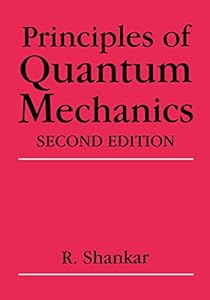#2,165 in Science & math books
Use arrows to jump to the previous/next product
Reddit mentions of Principles of Quantum Mechanics
Sentiment score: 1
Reddit mentions: 1
We found 1 Reddit mentions of Principles of Quantum Mechanics. Here are the top ones.
or
- Chipset: AMD rx 570
- Video Memory: 4GB GDDR5
- XFX double dissipation cooling design
- 1284Mhz (OC+)/ 1264Mhz (true Clock)
- XFX custom back plate
Features:
Specs:
| Release date | December 2012 |

> The bra-ket notation is literally just a way of notating linear algebra. The math doesn't change because of how you write it down.
You've obviously never taken a quantum mechanics class. It's taught as one or the other. I'm not arguing it's different, hence why I said the bra-ket "notation". It's simply the way chemists and physicists prefer to represent the schrodinger equation because it makes their math look better for their most commonly used applications.
I present to you, a perfect example.
This here is a book generally used by chemists when being taught quantum mechanics.
https://www.amazon.com/Physical-Chemistry-Molecular-Donald-McQuarrie/dp/0935702997
And now here is a book generally used by physicists when being taught the same thing.
https://www.amazon.com/Principles-Quantum-Mechanics-R-Shankar-ebook/dp/B000SEIXA2
Do you see how one book works almost exclusively in the linear algebra space while the other works almost exclusively using bra-ket notation? It's a choice, made by professors. Yes, you can learn both, it's not hard. This is why I know you've never taken a quantum mechanics class because this is made extraordinarily clear to everybody in the class. "These two things teach you the same stuff but in different ways. We choose to use this way."
> As for physical chemistry defining how everything works, how much particle physics do you do as a physical chemist?
Well considering I'm a spectroscopist, and a mechanist, quite a bit actually. And sure, I'm sure particle theory absolutely can explain pretty much everything.... in the longest most roundabout way possible. I wasn't aware, however, that the interactions of quarks (other than the electron....) came into play for the typical, everyday chemical reactions that occur constantly. In fact, are there not very few reactions that humans can achieve that actually have enough energy to split a proton or neutron into their constituent parts? I'm pretty sure that once the big bang cooled down everything pretty much settled into the subatomic particles we know and love today. So I mean, unless you plan on replicating the types of heat seen in the big bang.... that level of detail is... well... superfluous. Sure, it MAY be useful in SOME nuclear reactions, but even then, not always. If particle theory explained everything, why is it not used to explain everything? Go on.... explain. I'm waiting.
Also I find it funny that you assume that we didn't learn about subatomic particles smaller than the proton and the neutron. We simply know that they aren't really that useful for most normal situations. In theory? Sure. In reality? No. We're chemists, not theorists. We get shit done.
> Edit: it's also worth noting that bra-ket notation is typically introduced at the undergraduate level of quantum mechanics.
Congratulations! You've discovered the meaning of the word "introduced!"